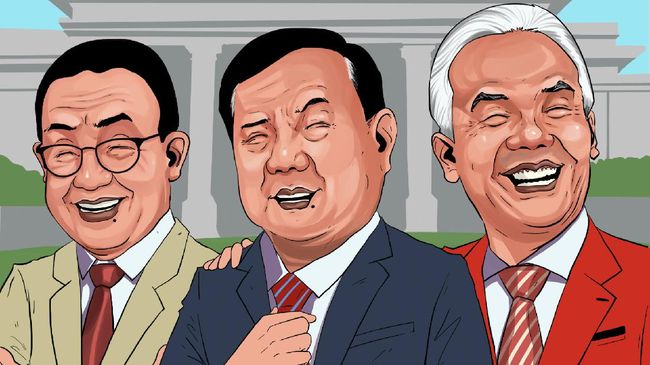The political landscape in Indonesia is heating up as the country approaches the next presidential election. Three prominent figures have emerged as potential candidates for the top position: Anies Baswedan, Prabowo Subianto, and Ganjar Pranowo. Each candidate brings their own unique set of qualities and promises to the table, igniting intense competition and debate among the Indonesian people.
Anies Baswedan, the current Governor of Jakarta, has garnered significant attention and popularity with his strong focus on social welfare. Anies, a former Minister of Education, has made education a top priority during his tenure as governor, implementing programs to improve access and quality of education for all citizens. His innovative approach to problem-solving and commitment to inclusivity have resonated with many Indonesians, particularly the younger generation who have felt largely underrepresented in past elections.
Prabowo Subianto, former Lieutenant General in the Indonesian National Armed Forces, stands as a strong contender against Anies Baswedan. Prabowo has run for president twice before, narrowly losing both times, and has built a loyal following over the years. His key strengths lie in his leadership skills and his military background, which some view as a necessary quality for a president in a country with complex security challenges. Prabowo also commands respect as a staunch nationalist, promising to prioritize the interests of the Indonesian people above all else.
Ganjar Pranowo, the Governor of Central Java, is another candidate who has gained considerable popularity in recent years. Known for his down-to-earth and approachable demeanor, Ganjar has successfully presented himself as a man of the people. His ability to connect with rural communities and address their needs has earned him praise and support from a broad range of voters. Ganjar’s focus on economic development, particularly in agriculture and small businesses, has resonated with those concerned about job creation and poverty alleviation.
As the election approaches, each candidate has begun outlining their vision and policy proposals for the future of Indonesia. Anies Baswedan’s platform focuses heavily on improving Indonesia’s healthcare infrastructure, reducing inequality, and combating corruption, while Prabowo Subianto promises to strengthen national security, support local industries, and boost economic growth through infrastructure development. Ganjar Pranowo, on the other hand, emphasizes unity among diverse cultural and religious groups, rural development, and increased social welfare programs.
The three-way competition between Anies Baswedan, Prabowo Subianto, and Ganjar Pranowo has sparked intense debates and discussions among Indonesians, highlighting the diverse needs and aspirations of the electorate. The forthcoming presidential election promises to be a crucial moment for the future of the country, as citizens must carefully consider which candidate aligns most closely with their own values and beliefs.
It is important to note that these candidates represent just a fraction of the political landscape in Indonesia. As the election campaign unfolds, other candidates may emerge and present their own unique visions for the country. Regardless, the choice between Anies Baswedan, Prabowo Subianto, and Ganjar Pranowo represents an opportunity for the Indonesian electorate to shape the direction and future of their nation.
